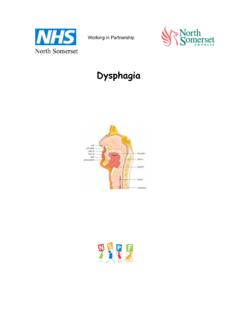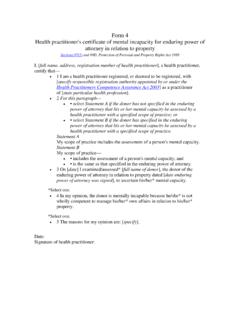Transcription of Easy Read Summary - Easyhealth
1 easy read Summary mental capacity Act 2005 - A Summary mental capacity means being able to make your own decisions The mental capacity Act 2005 will help people to make their own decisions. The mental capacity Act is a new law and will start later in 2007. This means you cannot start using the Act yet. The Act will affect people in England and Wales. The Act will affect people who are 16 years or older It will also protect people who cannot make their own decisions about some things, for example people with learning disabilities or mental health problems. This is called lacking capacity .
2 The Act tells people: l what to do to help someone make their own decisions about something l how to work out if someone can make their own decisions about something l what to do if someone cannot make decisions 2. about something sometimes. What the mental capacity Act covers This booklet tells you about: l The big ideas behind the Act l The new things the Act introduces. These include things like: New Lasting Powers of Attorney and deputies - these will start in October 2007. A new Court of Protection - this will start in October 2007. A new Office of the Public Guardian - this will start in October 2007.
3 A new criminal offence - this will start in April 2007. A new Independent mental capacity Advocate service - this will start in England in April 2007. In Wales it will start in October 2007. A Code of Practice that will tell people how to make sure they are following the Act - this will be available in April 3. 2007. Other things the Act introduces The Act also sets out the rules on: l Doing things in connection with care and treatment l Advance decisions to refuse treatment l Research involving people who lack capacity . All of these will start in October 2007. The rest of this booklet explains more about these things.
4 4. mental capacity Act - The Big Ideas This is a list of the 5 most important things people must do and think about when using the Act. These are: 1. Start off by thinking that everyone can make their own decisions. 2. Give the person all the support they can to help them make decisions. 3. No-one should be stopped from making a decision just because someone else thinks it is wrong or bad. 4. Anytime someone does something or decides for someone who lacks capacity , it must be in the person's best interests - there is a checklist for this. 5. When they do something or decide something for another person, they must try to limit the person's own freedom and rights as little as possible.
5 5. Assessing capacity No one can assume you lack capacity because of l how old you are l how you look l how you behave. If someone needs to make a decision for you, they must be sure that you cannot make the decision yourself. No-one can assume that you cannot make the decision yourself just because: l you have a disability l you cannot make more complicated decisions l you have not been able to make decisions like that in the past. 6. Best Interests If someone has to make a decision for you because you cannot make it yourself, they must decide what is in your best interests.
6 To work out what is in your best interests they must listen to what you want, ask people who know you and make sure you are involved. No one can decide what is in your best interests just because of: l how old you are l how you look l how you behave. 7. What sort of things are not covered by the Act? There are some decisions that can never be made under the Act by another person for someone who lacks capacity . Decisions that cannot be made on behalf of someone else include: whether to get married or make a civil partnership whether to have sex placing a child for adoption voting at an election.
7 8. Doing things in connection with care or treatment If you need care or treatment someone can give you the care or treatment you need. This may happen because you need help to decide what care or treatment you want because you cannot decide on your own because you do not have capacity at the time. The person caring or giving treatment must follow the best interests checklist to decide what is in your best interest. If you have made a Lasting Power of Attorney, an advance decision to refuse treatment, or have a deputy, then they would make these decisions if you lack mental capacity .
8 9. Lasting Power of Attorney Lasting Power of Attorney (LPA) is a legal document where you can say in writing who you want to make certain decisions for you, if you cannot make them for yourself. This person is called an attorney. You will be able to make a Lasting Power of Attorney from October 2007. You can only make this legal document if you understand what it means. You can already do this for property and money. You would do this using an Enduring Power of Attorney (EPA). The mental capacity Act has a new kind of power of attorney called a Lasting Power of Attorney (LPA).
9 The attorney must act in the best interests of the person lacking mental capacity . This new power can include decisions about: lHealth, like if you should have an operation lWelfare, like deciding which house is best for you l Property, like if you need to sell your house l Money, like looking after a lot of money. 10. Deputies The Court of Protection may make someone a deputy. The deputy can make certain decisions for you if you cannot decide everything for yourself. The Court can start making people deputies from October 2007. The Court will know what the deputy is allowed to do and what they are not allowed to do.
10 The deputy must act in the persons best interests. A deputy will only be appointed if it is in your best interests. It will not happen if you have made a Lasting Power of Attorney. The Public Guardian will keep an eye on what the deputy does. Sometimes the Court might need to make just one decision for you, so it will not need to appoint a deputy. The Judge will just make the decision. 11. This is called "a single order of the court". Advance Decisions to Refuse Treatment Sometimes a doctor needs to treat a person who does not have the mental capacity to say whether they want a particular treatment or not.















